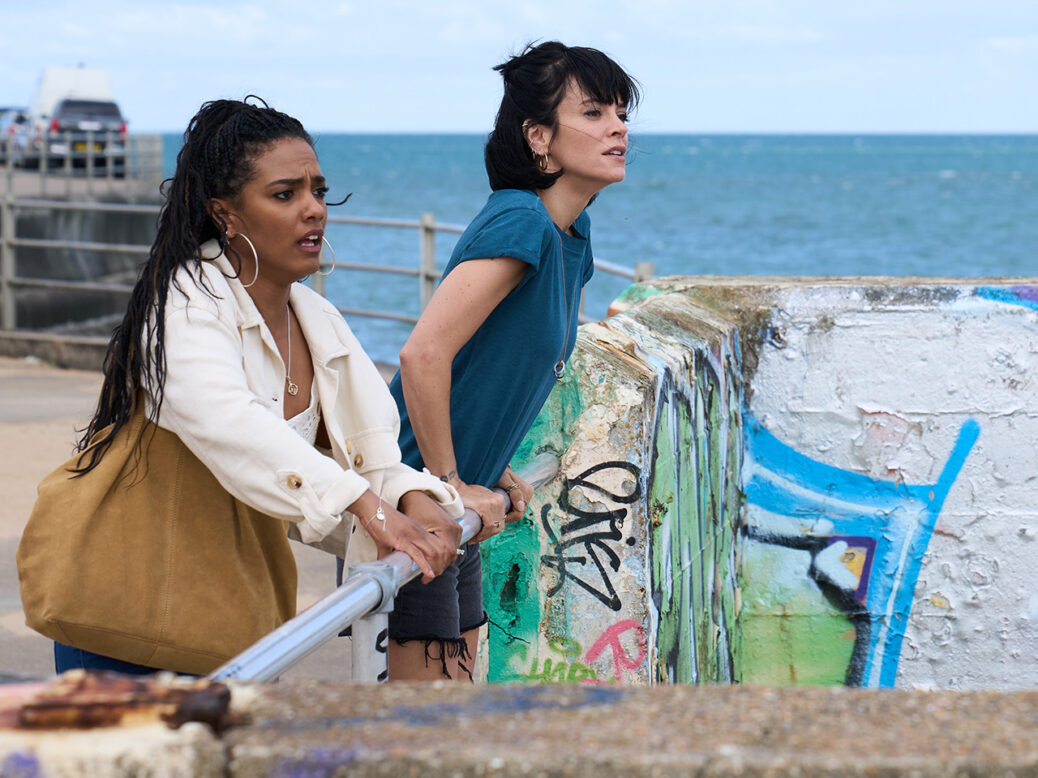
Much of the time I tend to avoid shows about “female experience” as this kind of signposting suggests a limitation. Good comedy or drama will be about female experience without trying – surely? Yet ever since Fleabag, the centring of what TV executives think of as “messy” female characters – and I think of simply as normal women – has produced show after show to illustrate the astonishing revelation that female people are complicated. Some have been astonishingly brilliant (I Hate Suzie). Some just try too hard.
Dreamland, a new comedy developed from a Bafta-winning short by Sharon Horgan, falls somewhere in the middle. Horgan is a screenwriter and actor who has pushed the envelope for women because she isn’t afraid of darkness, even within the confines of sitcom.
Indeed, Dreamland starts off with so much light and froth and pinkness, some will switch off straight away. But stay with this series set in Margate and something more interesting emerges. Mel (Lily Allen) is coming home to her family after things have not worked out for her in Paris. She is moody and drunk, crashing into the party her pregnant sister Trish (Freema Agyeman) is throwing to “manifest” the sex of her baby. (She already has boys, and desperately wants a girl.)
Two other sisters appear, the eminently sensible Clare (Gabby Best, who also helped write the show) and the ditzy youngest Leila (Aimee-Ffion Edwards). Add to this the always brilliant Frances Barber as their mum, Cheryl, who is having a secret lesbian affair. What unravels are complicated family dynamics and a certain amount of box-ticking of contemporary “issues”. Race: the aspirational Trish deals with racism in her own way. Sexuality: Cheryl is reluctant to be open about her new relationship. Class is there too, played mainly for laughs, as Leila starts seeing a ridiculous “DFL” (one of the many “Down from London” lot buying up Margate). Yet there’s heart to all this if you can ignore the stereotypes.
Lily Allen’s performance holds it together. She is a very fine actress and totally believable as Mel, who screws up and hurts others without meaning to. Her air of melancholia pushes Dreamland into darker territory that is not comedy at all and all the better for it.
Amazon Prime brings us more “female experience” in the form of a big-budget adaptation of Naomi Alderman’s novel The Power, written by Alderman herself. I decided a while back that life is too short for streaming services: everything is dragged out over zillions of episodes and I am a commitment-phobe. The Power though, is right up my street, with teenage girls the world over suddenly acquiring the ability to produce electricity through their fingertips. This is a lovely, witchy, subversive premise, and so I watched the first three episodes, but fear the curse of Amazon Prime has struck again. I am still waiting for the real action to start, despite a brilliant cast and multiple locations.
There is much jumping around between different girls discovering their mysterious new powers across the world. The first episode is wonderful but there is not enough to invest in any one character, as it cuts between Allie (Halle Bush), a girl abused by her foster father in the States, and Jos (Auli‘i Cravalho), whose mother (Toni Collette) is the mayor of Seattle. We hop to Nigeria to follow Tunde (Toheeb Jimoh) a wannabe journalist who steals his colleague’s story about these new “electric girls”. Then we are in eastern Europe, where the ruthless Tatiana (Zrinka Cvitešić) is married to the dictator who will harness this new phenomenon.
In London, Roxy (Ria Zmitrowicz) is the neglected child of gangster Bernie (the superb Eddie Marsan), who wants to use her power to avenge the horrific murder of Roxy’s mother. In a scene with nods to Carrie, she turns up at her father’s latest big Jewish wedding drenched in her mother’s blood. Zmitrowicz is terrific.
So we get it: this thing is global and each girl begins to realise what they can use this new power for. Will there be a revolution? Are these girls unstoppable? I liked what I saw, but whether I can commit to several hours of it, I am not sure. Actual “female experience” I tend to find, gets in the way of drawn-out drama.
Dreamland
Sky Atlantic/Now
The Power
Amazon Prime Video
Suzanne Moore is a former New Statesman critic and contributing editor. She has been writing for the magazine since 1987
[See also: How the streaming wars are shaping culture]

Become a subscriber and support our truth-telling journalism from as little as £49 a year! Or get a free tote bag if you subscribe to our bundle plan. Visit newstatesman.com/110subscribe to explore our anniversary offers
This article appears in the 12 Apr 2023 issue of the New Statesman, The Anniversary Issue





